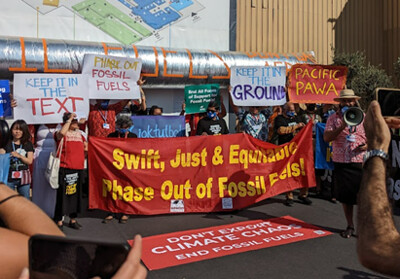 This past Tuesday, our cohort attended an event presenting on the Emission Gap Report by the United Nations (UN). This report provides an updated assessment on the gap between our current global greenhouse gas (GHG) emissions and our goals for 2030 to limit the global temperature below 1.5 degree Celsius. This is necessary to minimize the most significant harm from climate change as determined by the Paris Agreement of 2015.
This past Tuesday, our cohort attended an event presenting on the Emission Gap Report by the United Nations (UN). This report provides an updated assessment on the gap between our current global greenhouse gas (GHG) emissions and our goals for 2030 to limit the global temperature below 1.5 degree Celsius. This is necessary to minimize the most significant harm from climate change as determined by the Paris Agreement of 2015.
The presentation was devastating. In 2021, total GHG emissions across the globe set a new record. The gravity of the situation felt clear and real. We are not getting better, we are getting worse.
To limit global temperatures below 1.5 degree Celsius, we need to reduce emissions by 45% by 2030. The UN announced that current commitments for GHG emissions, known as Nationally Determined Contributions (NDCs), would decrease global emissions by 17%. So far from where we need to be. Current emissions would increase our global temperature to 2.7 degree celsius causing unlivable conditions on our earth.
After the presentation, we quickly transitioned to a panel discussing climate solutions. But, I couldn’t release my feelings of betrayal. How dare you talk about the work you are doing to reduce emissions when it is so unfathomably inadequate? There was no space for me to grieve, to reconcile, and to feel the humanity that I felt was being threatened. I cried, and I wanted them to see it. I wanted them to look me in their eyes and see, through their numbers, data, and reports, the person inside that was scared. If these are our leaders, why aren’t they protecting us? Did they even care?
The work that needs to be done can no longer be incremental change. We need transformative, large-scale action. As the panel went on, I heard a speaker talking about just energy transitions. Our current systems are built on social injustices. Environmental degradation, such as fossil fuel infrastructure or mining, can happen because low-income communities, indigenous peoples, and peoples of color burden the toxics that these activities produce. Big corporations sacrifice the bodies of these communities in the pursuit of wealth. It is disgusting. These communities are also disproportionately affected by climate impacts due to the locations of their neighborhoods and the conditions of their life.
Thus, climate change cannot be solved without changing the fabric of these systems. You cannot develop solutions using the same instruments that cause the problem. To address climate change, we need to address racism, sexism, and the economic system of constant growth that exploits our land and people. We need climate justice.
The urgency of just energy transitions is now. “Just energy transitions” call for the eradication of our harmful systems based on fossil fuels to cleaner, more equitable systems based on renewable energy. We must support local communities, and listen to the voices of indigenous peoples and peoples of color to guide our solutions. We cannot address systemic injustice without centering communities that have been victims of oppression and learning how they strive to liberate themselves. This is not just an opportunity, but absolutely necessary to stop the driving forces that prevent us from tackling the climate crisis.
Youth recognize the urgency to address the climate crisis and aren’t afraid to challenge the status quo. We must recognize the power of our voices together and call on our leaders to invest in a future based on justice for all.